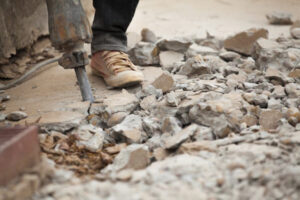The work that you do is vitally important, but it also has inherent risks. Whenever you are doing work that is potentially near any underground utilities, you have to properly survey the area. You won’t be able to identify what is under the ground visually – you have to have the proper tools (like GPR or Ground Penetrating Radar) and the proper skills to determine the type of underground utility and where they are. If you don’t do this work first, you run substantial risks, from financial liability to potential death or injury. Learn all about the potential dangers of striking underground utilities when you dig.
Before You Dig!
Most people in this area have heard the commercials warning about calling to have utilities marked before they dig. This is because it is so easy to accidentally strike utilities when excavating. Thousands of excavation jobs are starting each day in this country, and without proper planning and surveying, each one could potentially become a utility damage incident. In 2019 there were over 450,000 damage incidents, an increase over the previous year for a fifth straight year. Everyone in this industry has a responsibility to prevent utility strikes and damage incidents.
The Costs Of Striking Underground Utilities
The laws and penalties surrounding excavation and utility damage from strikes during excavation vary from state to state. In some states, an excavator who is found liable for a dig violation that caused damage could face serious fines or even be sent to jail, and of course, there are legal costs associated as well. The potential costs aren’t limited to legal ones, however. Striking a utility line halts work at the site, costing time and revenue. Utility strikes can also result in equipment damage, property damage, and reputation damage. Ultimately the worst outcome is that a utility strike could cause the injury or death of someone on your crew.
You Can Prevent Utility Strikes When Searching for Underground Utilities
Safety comes down to being educated and following guidelines. Before you start a project, consult the professionals. “Miss Utility” or 811 is a service that locates public utility lines, but you will likely be required to have a private utility locator hired as well. Do this before every single job. Additionally, make sure that you and your team are fully up-to-date on OSHA guidelines and other best practices before ever beginning an excavation project.
Concrete Visions Will Get The Job Done Right
Concrete Visions has been working with clients for over 25 years. Our G&M Services installers are certified with the industry’s major firestop product manufacturers. As part of our firestop service, we can assess abnormal field conditions and, with the manufacturer’s technical support assistance, provide engineering judgments in a timely fashion to comply with contract specifications. Our Field Mechanics undergo ongoing training, including mandatory monthly safety meetings, weekly Toolbox Talks where safety and equipment information is shred, and trainings on safe work standards and safety best practices.

